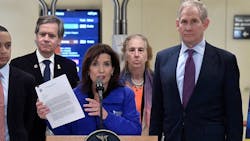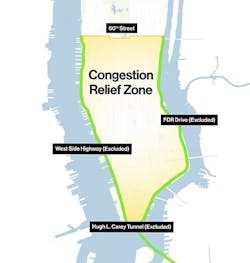New York’s infamous congestion pricing program is dying again, this time because of orders from the Trump administration.
On Wednesday, Transportation Secretary Sean Duffy revoked the Department of Transportation’s approval for the tolling scheme.
“The recent imposition of this CBDTP (Central Business District Tolling Program) pilot project upon residents, businesses, and commuters left highway users without any free highway alternative on which to travel within the relevant area,” Duffy said in his letter to New York Governor Kathy Hochul. “Moreover, the revenues generated under this pilot program are directed toward the transit system as opposed to the highways. I do not believe that this is a fair deal.”
The program affects portions of the Interstate Highway System. States generally need approval to toll highways: Title 23 of the United States Code gives highway tolling authority to the Secretary of Transportation. The DOT Federal Highway Administration’s Value Pricing Pilot Program gave New York permission to issue CBDTP in November 2024.
Following Trump’s campaign promise to revoke congestion pricing, Duffy’s letter revoked the VPPP approval. Duffy argued that the congestion pricing program was ineligible for two reasons: Drivers had no toll-free, alternative route; and the program seemed to determine rates on revenue targets rather than congestion reduction.
The Metropolitan Transportation Authority, charged with executing the tolling program, has announced that tolling remains in effect while it battles the order in court.
What is NYC's congestion pricing program?
The New York City program is the nation’s first congestion pricing program and has been in effect since January 5. It follows examples set by cities like London and Singapore.
Also known as the Central Business District Tolling Program, the toll is implemented by New York State’s Department of Transportation and the Metropolitan Transportation Authority to both reduce congestion in Manhattan’s central business district and raise significant revenue. MTA projected the program would generate $500 million in its first year and as much as $1 billion annually by 2031.
The program suffered a tumultuous past: Originally scheduled for June 2024, Hochul suddenly postponed the program after community backlash. Four months later, Hochul renewed the program with a new pricing structure to take effect in January.
The fees increased during peak traffic periods and decreased for E-ZPass users. MTA planned to progressively raise fees for most vehicles in 2028 and in 2031. Large tractor-trailers face tolls ranging from $5.40 to $54 for every entry. Small commercial trucks faced tolls ranging from $3.60 to $36.
Trucking industry applauds DOT’s cancellation
The American Trucking Associations commended the move and called the program a “disastrous tolling scheme.”
“Truckers deserve our gratitude. Instead, New York imposed a $21.60 toll—eventually climbing to $36—each time they crossed south of 60th Street,” Chris Spear, ATA president and CEO, said. “Even worse, the proceeds of this shakedown were not dedicated to improving roads and bridges but rather subsidized a bloated and mismanaged transit bureaucracy that has proven unable to control spiraling costs. New York’s subways were never going to deliver the city’s freight.”
The Owner-Operator Independent Drivers Association similarly welcomed DOT’s move.
“New York City’s congestion pricing plan was anti-trucker to begin with, and we will continue fighting to ensure it doesn’t come back,” Todd Spencer, OOIDA president, said. “Beyond New York City, we encourage the Trump administration and Congress to fight the expansion of tolling across the country.”
See also: Traffic congestion is down nationally, yet its cost increased by 15% YoY
New York responds
State officials have vowed to continue the program and fight the federal government in court.
In a press conference Wednesday evening, Governor Hochul defended the program and stressed that the issue threatened state sovereignty.
“We were in fight mode within seconds of us getting this notification. Our MTA was prepared,” Hochul said. “We knew this could come and filed a lawsuit within minutes. I’m very confident we will be successful.”
Legal battle with White House
New York’s MTA quickly filed a lawsuit against DOT leadership in district court.
The authority argued that FHWA had no authority to terminate existing VPPP agreements and that such a power “would clearly undermine the purposes of the VPPP.” The lawsuit also argued that FHWA conducted no environmental review on the effects of removing the congestion toll.
The lawsuit declared that MTA would continue to implement tolling until a court ordered otherwise and requested the court to declare FHWA’s termination null.
In the press conference, Hochul publicly confirmed that MTA would continue to implement tolls and operate tolling cameras.
“The cameras are staying on,” Hochul said.
“We’re not turning off the tolls until there’s a verdict,” MTA CEO Janno Lieber said.
About the Author
Jeremy Wolfe
Editor
Editor Jeremy Wolfe joined the FleetOwner team in February 2024. He graduated from the University of Wisconsin-Stevens Point with majors in English and Philosophy. He previously served as Editor for Endeavor Business Media's Water Group publications.


